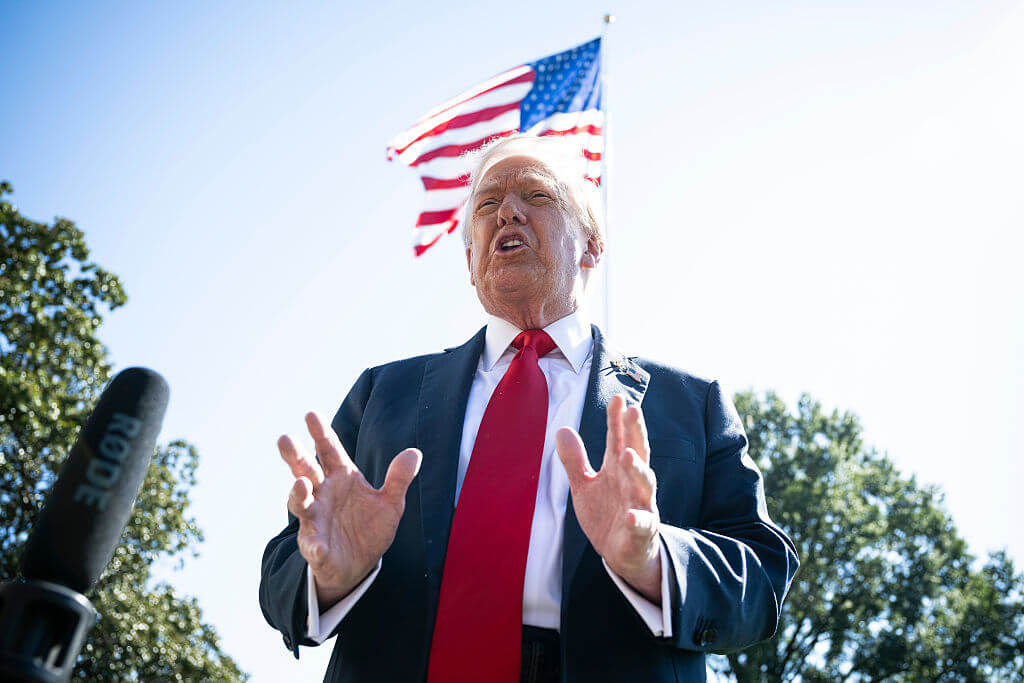Analysis: Is Trump’s Gaza ceasefire plan more about MAGA than the Middle East?
The president’s proposal could perhaps end two years of stalemate in the Israel-Hamas war

President Donald Trump on Oct. 5. Photo by Graeme Sloan/Bloomberg via Getty Images
President Donald Trump’s call Friday night for Israel to “immediately stop the bombing of Gaza” accomplished what no protest movement or mediator had achieved in two years of the Israel-Hamas war. It offered a rare moment of relief and a glimmer of hope to end the suffering on both sides since the attacks of Oct. 7, 2023, when Hamas massacred close to 1,200 people inside Israel and abducted 251. Since then, according to local officials, more than 66,000 Palestinians have been killed, many of them civilians, and much of Gaza has been reduced to rubble.
Yet the plan said as much about Trump’s domestic politics as his diplomacy. The ceasefire proposal that both Israel and Hamas accepted reflected a broader campaign pledge to Arab voters and his MAGA base to end America’s involvement in foreign wars.
And while Israel was the first to embrace the deal’s principles — hailing it as a victory over Hamas and taking the first steps toward implementation — it came at a price that many Israelis may find difficult to accept.
Israel has agreed to pause its military offensive before all hostages are released. Meanwhile, key demands from Hamas in the talks led by Trump’s envoys, Steve Witkoff and Jared Kushner, in Egypt this week reportedly include a further Israeli military withdrawal from inside Gaza, discussions on an alternative national government to oversee the territory and no commitment to disarm. Two of the Arab intermediaries most trusted by Trump — Qatar and Turkey — remain close to Hamas and hostile to Israel.
Still, Trump appeared unbothered by those contradictions.
“You want to get your hostages back, right?” Trump told an Israeli reporter from the pro-Netanyahu Channel 14 network. “It’s a great deal for Israel. It’s a great deal for the entire Arab world, the Muslim world, and the world.” The president also used an expletive during a Friday call with Israeli Prime Minister Benjamin Netanyahu after the Israeli leader voiced doubts about Hamas’ sincerity, according to an Axios report.
This captured his approach to the Israel-Hamas war.
His broader strategy aligns closely with Israel’s stated war goals and shows less daylight between Washington and Jerusalem than under the Biden administration. Still, Trump’s message was at once isolationist and populist: that he can end foreign wars and refocus American power at home. He seemed to be delivering on a campaign promise to Arab voters in Michigan — an electorate that may have shifted the dynamics of the presidential race due to Joe Biden’s management of the Gaza crisis — as well as appealing to a changing right-wing base less tied to old alliances and traditional support for Israel.
It’s also a win for Trump himself. If the deal holds, the president could claim a political and personal victory: a war ended, hostages freed, and the image of the consummate dealmaker restored.
Commentators also noted that the timing is just days before the Friday announcement of the Nobel Peace Prize, a long-sought goal for Trump. The nomination deadline for the 2025 prize was at the end of January; Netanyahu nominated Trump in June.
“My proudest legacy will be that of a peacemaker and unifier,” Trump said at his inauguration.
Trump courts the Israeli public
Even through a pro-Israel lens, this doesn’t seem to be about Netanyahu, who has survived through years of protests and an ongoing corruption trial. Delivering a deal that ends the war may rescue the prime minister politically, but Trump has signaled that his sympathies lie with the Israeli public rather than its embattled leader.
In recent weeks, he has echoed protesters in Tel Aviv calling for the hostages’ release and an end to the fighting. “Bibi took it very far and Israel lost a lot of support in the world,” Trump told Israeli journalist Barak Ravid, using the nickname for Netanyahu. “Now I am going to get all that support back.”
A recent poll showed more Americans siding with Palestinians than Israelis for the first time in decades, a majority oppose sending further U.S. aid to Israel, and six in 10 want the war ended even if hostages remain or Hamas survives.
Even if he succeeds in improving Israel’s image, Netanyahu is far less popular among Americans. A growing number of mainstream Democrats who once avoided public criticism of Israeli policy have recently spoken out and blamed Netanyahu for causing “irreparable damage” to the U.S.-Israel relationship. A Washington Post survey of 815 Jewish Americans published on Saturday found that 68% rated Netanyahu’s leadership of Israel as poor or fair.
In a text message exchange with CNN host Jake Tapper on Sunday, Trump indicated the pressure has moved on to Hamas. The terror group, Trump said, faces “complete obliteration” if it refuses to cede power and control of Gaza.
















